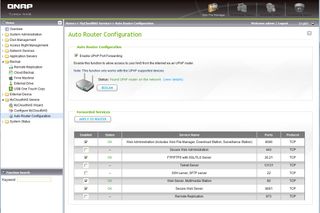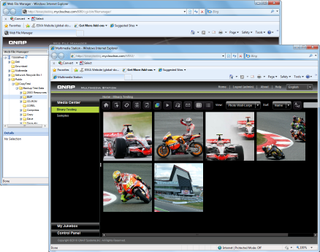
The MyCloudNAS service is supposed to work automatically with UPnP routers, but may require port forwarding rules to be created manually.
It claimed to have succeeded with our Linksys WAG160N wireless router but when we tried to access the services they failed to load. Our solution was to manually add the relevant port forwarding rules to our router after which the services became accessible. Along with username and password access for each service you can also enable HTTPS only for better security.
There are plenty more features to play with as the appliance runs iTunes and UPnP media servers while the Multimedia Station can be used for publishing photos, videos and music in web galleries. The Web File Manager can be used to upload and download files from a browser interface, plus the appliance can host your own web sites.

Using MyCloudNAS allowed us to present the Web File Manager and Multimedia Station to remote users.
A good range of backup features are also provided with NetBak Replicator software running scheduled backups of Windows workstations and servers. Along with the cloud backup services, there's also support for Rsync servers for remote replication.
For real world testing we loaded five 1TB SATA drives and created a RAID-5 array which took around six hours to build. Our performance tests show that standard 3Gbit/ss SATA2 disks are quite capable of delivering the goods.
We used a Dell PowerEdge R515 server running Windows Server 2008 R2 64-bit and saw drag and drop copies to a mapped share return read and write speeds of 107.5MB/s and 96MB/s. FTP operations were slightly faster with the FileZilla utility reporting speeds of 108MB/s and 103MB/s respectively.
Dave is an IT consultant and freelance journalist specialising in hands-on reviews of computer networking products covering all market sectors from small businesses to enterprises. Founder of Binary Testing Ltd – the UK’s premier independent network testing laboratory - Dave has over 45 years of experience in the IT industry.
Dave has produced many thousands of in-depth business networking product reviews from his lab which have been reproduced globally. Writing for ITPro and its sister title, PC Pro, he covers all areas of business IT infrastructure, including servers, storage, network security, data protection, cloud, infrastructure and services.

